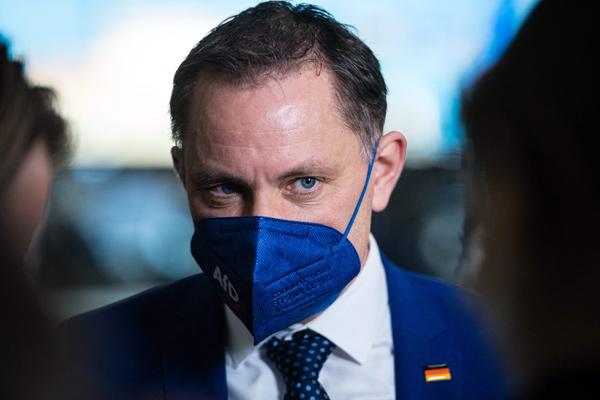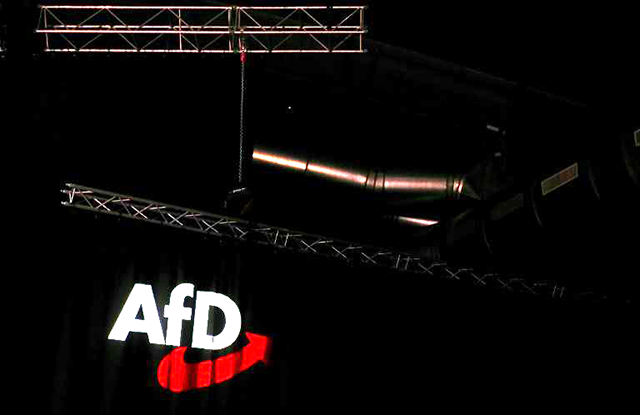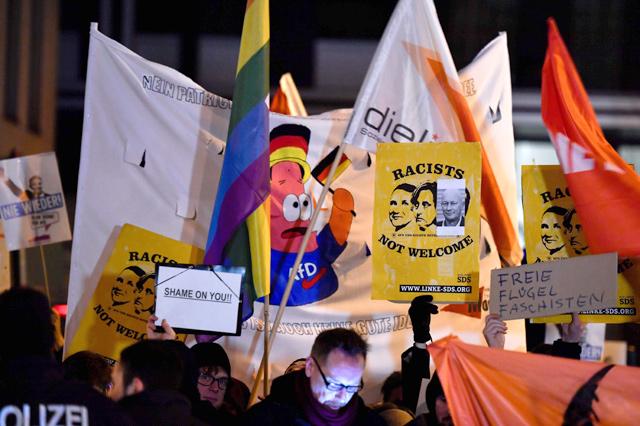You are here
Germany’s divided far-right AfD to launch election bid
By AFP - Apr 11,2021 - Last updated at Apr 11,2021

Far-right Alternative for Germany (AfD) party co-chairman Tino Chrupalla gives a TV interview during a congress of far-right Alternative for Germany (AfD - Alternative fuer Deutschland) party in Dresden, eastern Germany, on Saturday (AFP photo)
DRESDEN, Germany — The far-right Alternative for Germany (AfD) will firm up its election manifesto this weekend as Germany prepares for the post-Merkel era, with the party seeking to reverse a lag in support amid infighting and an ailing effort to capitalise on the pandemic.
Members of the anti-Islam, anti-immigration AfD gathered on Saturday despite coronavirus restrictions for a two-day congress in Dresden, to finalise their strategy ahead of the general election on September 26.
With Angela Merkel stepping down after 16 years as chancellor, the AfD’s “Merkel must go” slogan will need an overhaul.
The AfD caused a sensation in Germany’s last election in 2017 when it secured almost 13 per cent of the vote, entering parliament for the first time as the largest opposition party.
But it has lost support as Germany reels from the coronavirus pandemic, and has lately been plagued by internal divisions, links to radical COVID-19 deniers and accusations of ties to neo-Nazi fringe groups.
Latest surveys have the party polling at between 10 and 12 per cent, with Merkel’s CDU/CSU on around 27 per cent and the surging Greens not far behind.
‘Lockdown mania’
In key regional elections in the southern states of Baden-Wuerttemberg and Rhineland-Palatinate in March, the AfD saw its support plunge by around a third.
The drop in support has coincided with AfD members courting controversy by joining anti-vaxxers and “Querdenker” (Lateral Thinkers) at various demonstrations against coronavirus restrictions.
AfD co-leader Joerg Meuthen on Saturday vowed to dispel “these orgies of bans, these jailings, this mania for locking down”.
With Merkel and state leaders expected to tighten infection control measures further on Sunday, the far-right unveiled its election slogan of “Germany. But normal” — at least in part targeting coronavirus restrictions.
During a violent mass protest in November, AfD members were accused of letting far-right activists into the Reichstag parliament building.
The party has also been hit by revelations that the government intends to place it under surveillance for posing a threat to democracy.
Media reports in March said the Federal Office for the Protection of the Constitution (BfV) had classified the AfD as a “suspected case” of right-wing extremism, paving the way for intelligence agents to tap its communications and possibly use undercover informants.
The AfD is challenging the classification in emergency proceedings, accusing the BfV of not taking sufficient care to prevent the information from leaking to the press.
Against a backdrop of infighting between the hard right and a more moderate wing around Meuthen, motions calling for the party to elect its top candidates for the September elections were withdrawn.
Meuthen wants the decision to be made later by a vote among all party members.
The AfD has long been bitterly divided between those who support Meuthen and a more radical faction, known as The Wing, loyal to firebrand Bjoern Hoecke.
Another motion from a handful among the 600 delegates calling for Meuthen’s removal was rejected, although a second that would impose term limits for the party leadership could yet see him leave by the end of the year.
Pariah party
The AfD is expected to choose a two-person team to lead it into the election, with Meuthen’s co-president Tino Chrupalla considered the likely contender.
Many members would like to see him joined by economist and parliamentary group co-leader Alice Weidel, but Meuthen’s supporters would prefer the more moderate Joana Cotar.
Starting out as an anti-euro outfit in 2013, the AfD capitalised on public anger over Merkel’s 2015 decision to allow in a wave of asylum seekers from conflict-torn countries such as Syria, Afghanistan and Iraq.
The hard-right party has often courted controversy by calling for Germany to stop atoning for its World War II crimes.
The AfD has “dramatically radicalised itself” in recent years, which has “divided the party in two”, political scientist Hajo Funke of Berlin’s Free University, who specialises in the far-right, told AFP.
He noted a series of deadly right-wing extremist attacks against immigrants and Jews committed since 2019 had left the political far right “isolated” while the AfD had only managed to offer a “chaotic back-and-forth” in the face of the pandemic.
“For now it is not considered a party with which you could form a coalition,” given the political mainstream’s still united front in treating the AfD as a pariah.
Related Articles
BERLIN — Germany’s domestic security agency has placed the far-right AfD under surveillance for posing a threat to democracy, parliamentary
BERLIN — A long simmering row between the leaders of Germany's far-right AfD Party and its radical fringe has boiled over, sapping their str
BERLIN — The small state of Thuringia broke a German political taboo on Wednesday after a candidate for the regional premiership was heaved













